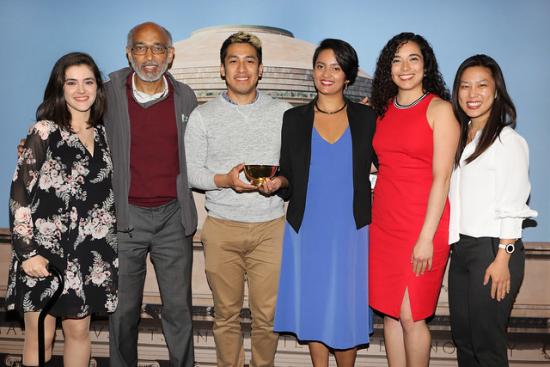
Erin Byrne Rousseau, HST Co-Director Emery Brown, Christian Landeros, Aditi Gupta, Claudia Elena Varela, and Lucy Hu at the 2019 MIT Awards on May 13.
In 2017, five Ph.D. students in the Medical Engineering and Medical Physics (MEMP) program at HST launched efforts to markedly expand the program’s outreach to students from underrepresented groups in the sciences, e.g. women, minorities, and students with disabilities.
Recognizing opportunities to adopt more inclusive practices across HST, Aditi Gupta, Lucy Hu, Christian Landeros, Erin Byrne Rousseau, and Claudia Elena Varela formed the HST MEMP Diversity Ambassadors. They did so “over a shared interest in advancing the representation of marginalized communities in our field,” according to Hu. “We developed the mission over the course of two years with the goal of enhancing the HST community.”
From its inception, the group has taken a proactive approach to broaden HST’s minority outreach, targeting conferences such as the Society of Hispanic Professional Engineers, the Society for the Advancement of Chicanos/Hispanics and Natives Americans in Science, and the National Society Black Engineers, for recruiting new students.
More broadly, the group has sought to improve language in both the HST MEMP Statement of Objectives and the HST MEMP application itself, adding specific phrases addressing the unique and personal challenges faced by minorities in STEM as well as the individual paths taken by those with non-traditional academic backgrounds.
Other initiatives include the formation of a sister group, the HST MD Diversity Ambassadors, a growing effort based out of the Harvard Medical School side of HST. And, through the HST MEMP Application Assistance Program (MAAP), Gupta, Hu, Landeros, Rousseau, and Varela have not only provided one-on-one mentorship to MEMP Ph.D. applicants with diverse profiles, but they have also connected mentees with current HST students, increasing the number of mentors to eleven in 2018.
“We started and now run an application assistance program which aims to assist students who aren’t traditionally represented in biomedical Ph.D. programs in the graduate application process,” said Hu, who described MAAP as the most gratifying part of her work as an Ambassador. “There are few experiences more rewarding than hearing that our mentees got into programs at MIT and across the country.”
Such successes have not gone unrecognized. The group recently won an MIT Bridge Builder Award at the Institute’s annual MIT Awards ceremony. On May 13, the five were acknowledged for their “noteworthy collaboration and partnership between student organizations, living groups, dorms, teams, individual students, non-profit organizations, and/or governmental groups to raise awareness, share knowledge, provide solutions, and show commitment to social justice and a more inclusive MIT.”
“We were honored to receive the award, and delighted to see that MIT as an institution supports our vision of a diverse and inclusive community of innovators,” Hu said of the honor.
Those aspiring to effect change in their own communities and create more welcoming spaces for all, within and beyond the health sciences, are encouraged by the Diversity Ambassadors to take action. In her advice for future Bridge Builders, Hu stressed the importance of collaboration.
“Finding a community of people with shared interests and values is key to facing monumental walls that at times seem insurmountable. Through a supportive community and coalition building, one can find the strength and resilience to continue working towards one’s goals.”
To learn more about the 2019 MIT Awards, click here.